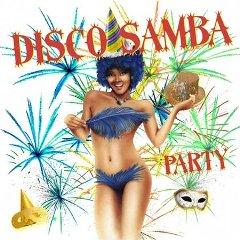Disco Samba Party (2013)
Disco Samba Party (2013)

01. Kid Monroe - Mambo N. 5 (13:04) 02. Los Camarones - Que Te la Pongo (03:52) 03. Grupo Tato - 2 the Night (06:18) 04. Orquesta Manteca - Delicado (14:48) 05. Joe Dibrutto - Disco Inferno (03:31) 06. Cariocas - Lambada (04:44) 07. Joe Dibrutto - Night Fever, Stayin Alive (05:20) 08. Moonbay - Hot Stuff (03:54) 09. Joe Dibrutto - I Got You - I Feel Good (02:10) 10. Grupo Batucada - Johanna (07:45) 11. Kaleidoscopio - Voce Me Apareceu - Radio Edit (03:03) 12. Montefiori Cocktail - Hu Ha (04:10) 13. Bengi Jumping - Sandokan (01:39) 14. C Bross - Si Seсor - Tito Valdez Version (02:37) 15. Cristian Stolfi - Escucha la Musica (06:00) 16. Carlihno - Meravigliao (04:42) 17. Los Rios - Ritmo Do Samba (05:51) 18. Double Dee - People Get Up - Radio Mix (03:37) 19. Ivana Parnasso - Happy Birthday - Bossa Instrumental (02:43) 20. DJ Rodriguez - Bota Pra Quebar (05:19) 21. Ely Bruna - The Rhythm of the Night (04:16) 22. Massimo Papasidero - Oh Happy Day (04:21) 23. The Shiffers - Reality (02:41) 24. Montefiori Cocktail - Tekila Bum Bum (06:22) 25. Montefiori Cocktail - One Note Samba (02:57) 26. Papik - We Are the World (04:13) 27. Christian Lisi - Besame Mucho (03:08) 28. Los Caliente - Musca Negra (04:59) 29. Jestofunk - Can We Live (06:24) 30. Double Dee - Found Love (03:44)
Samba, an old Brazilian style of dance with many variations, is African in origin. It has been performed as a street dance at carnival, the pre-Lenten celebration, for almost 100 years. Many versions of the Samba (from Baion to Marcha) are danced at the local carnival in Rio. The ballroom Samba or Carioca Samba is derived from the rural "Rocking Samba" and has been known for many years. (The Carioca is a small river that runs through Rio de Janiero - hence the name Carioca refers to the people of Rio.) Today Samba is still very popular in Rio. During carnival time there are "schools of Samba" involving thousands of elaborately-costumed dancers presenting a national theme based on music typical of Brazil and Rio in particular.
Before 1914 it was known under a Brazilian name "Maxixe". As early as 1923 an international meeting of professors of dancing took note of the rise of the Samba's popularity, particularly in France. A French dance book published by Paul Boucher in 1928 included Samba instructions. The dance was introduced to United States movie audiences in 1933 when Fred Astaire and Dolores Del Rio danced the Carioca in Flying Down to Rio and several years later, Carmen Miranda danced the Samba in That Night in Rio. A Samba exhibition was given at the November 1938 meeting of the New York Society of Teachers of Dancing. General interest in the Samba was stimulated at the 1939 World's Fair in New York, where Samba music was played at the Brazilian Pavilion. A few years later the Brazilian composer Ary Barroso wrote the classic Samba, "Brasil," which quickly became a hit, and in 1944 he went to Hollywood to write the score for the musical Brazil.
Samba has a very specific rhythm, highlighted to its best by characteristic Brazilian musical instruments: originally called tamborim, chocalho, reco-reco and cabaca. Much of Samba music came from daily life in Rio, the first famous example being "Pelo Telefone" composed by Donga. To achieve the true character of the Samba a dancer must give it a happy, flirtatious and exuberant interpretation. Many figures, used in the Samba today, require a pelvic tilt (Samba tic) action. This action is difficult to accomplish, but without it the dance loses much of its effect. Principal characteristics of the Samba are the rapid steps taken on a quarter of a beat and the pronounced rocking motion and sway of the dancing couple.
The Samba (also known as the Brazilian Waltz) is now a moderately popular ballroom dance, limited pretty much to experienced ballroom dancers because of its speed. --- dancelovers.com
Last Updated (Thursday, 30 July 2015 21:07)








